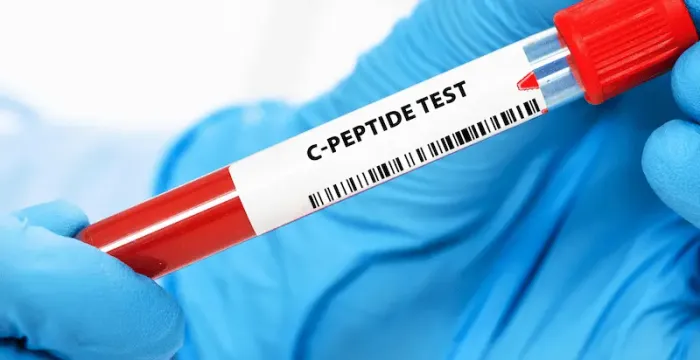C-Peptide Test Overview and Normal Levels
Know about the C-peptide test, why it is important, why it is done, tips to prepare for the test and how to maintain healthy insulin levels.

Written by Dr. Mohammed Kamran
Reviewed by Dr. D Bhanu Prakash MBBS, AFIH, Advanced certificate in critical care medicine, Fellowship in critical care medicine
Last updated on 2nd Sep, 2025

Introduction
If you or a loved one has been diagnosed with diabetes or is experiencing symptoms related to blood sugar issues, your doctor may recommend a C-Peptide test. This simple blood test helps determine how much insulin your body is producing. Understanding this test can help you manage your health better.
In this article, we’ll explain: What a C-Peptide test is, why it’s important, normal levels and what they mean, how to prepare for the test and when to consult a doctor.
Let’s dive in!
Consult an Endocrinologist for Personalised Advice
What is a C-Peptide Test?
The C-Peptide test measures the amount of C-peptide in your blood. C-peptide is a substance produced along with insulin in the pancreas. When your body makes insulin, it releases both insulin and C-peptide in equal amounts.
Why is this important?
It is important as:
• Helps distinguish between Type 1 and Type 2 diabetes.
• Determines if your pancreas is producing enough insulin.
• Helps diagnose hypoglycemia (low blood sugar).
• Monitors insulin production in people undergoing diabetes treatment.
Why is the C-Peptide Test Done?
Doctors recommend this test for several reasons:
1. To Diagnose Diabetes Type
• Type 1 Diabetes: The pancreas produces little to no insulin (low C-peptide levels).
• Type 2 Diabetes: The body makes insulin but doesn’t use it properly (normal or high C-peptide levels).
2. To Check Insulin Production
• Helps doctors decide if a patient needs insulin injections or oral medications.
3. To Identify Hypoglycemia Causes
• Low blood sugar can happen due to excessive insulin production (insulinoma) or misuse of diabetes medications.
4. After Pancreas or Islet Cell Transplant
• Checks if the transplanted cells are producing insulin.
Normal C-Peptide Levels
C-peptide levels vary based on fasting or post-meal conditions:
What Do Abnormal Levels Mean?
High C-Peptide Levels
• Type 2 Diabetes (the body produces insulin but can’t use it properly).
• Insulin resistance (common in obesity or metabolic syndrome).
• Insulinoma (a rare pancreatic tumour producing excess insulin).
Low C-Peptide Levels
• Type 1 Diabetes (pancreas stops making insulin).
• Long-standing Type 2 Diabetes (pancreas loses insulin-producing ability over time).
• Excessive insulin use (if a diabetic takes too much insulin, C-peptide drops).
How is the C-Peptide Test Done?
The test is simple and involves:
1. Blood Sample Collection: A small blood sample is taken from your arm.
2. Fasting or Non-Fasting: Some tests require fasting for 8–12 hours, while others are done after eating.
3. Results in a Few Days: Your doctor will interpret the results based on your medical history.
How to Prepare for the Test?
• Follow your doctor’s instructions on fasting.
• Inform your doctor about any medications you’re taking (some can affect results).
• Stay hydrated and avoid strenuous exercise before the test.
Tips to Maintain Healthy Insulin Levels
If your C-peptide levels are abnormal, here are some ways to improve insulin function:
For Low C-Peptide (Type 1 Diabetes or Insulin Deficiency)
• Follow insulin therapy as prescribed.
• Monitor blood sugar regularly.
• Eat balanced meals with controlled carbs.
• Exercise moderately (consult your doctor first).
For High C-Peptide (Insulin Resistance or Type 2 Diabetes)
• Lose weight (even a 5–10% reduction helps).
• Eat a low-glycemic diet (whole grains, vegetables, lean proteins).
• Exercise regularly (30 minutes daily improves insulin sensitivity).
• Avoid sugary drinks and processed foods.
When to See a Doctor?
Consult your doctor if you experience:
• Frequent thirst, hunger, or urination (signs of diabetes).
• Unexplained weight loss or fatigue.
• Dizziness, sweating, or confusion (low blood sugar symptoms).
Final Thoughts
The C-Peptide test is a valuable tool in understanding insulin production and diagnosing diabetes types. Knowing your levels helps doctors tailor the right treatment plan for you.
A healthy lifestyle, proper diet, and regular check-ups can make a big difference in managing your condition. If you have concerns about diabetes or blood sugar issues, don’t hesitate to get tested and seek medical advice.
Consult an Endocrinologist for Personalised Advice
Consult an Endocrinologist for Personalised Advice

Dr. Nilotpal Mitra
General Physician/ Internal Medicine Specialist
21 Years • MBBS, PGDGM ( Geriatric Medicine), ACMDC (an Advance course in Diabetes and cardiovascular diseases from PHFI and WHF )
Kolkata
MCR SUPER SPECIALITY POLY CLINIC & PATHOLOGY, Kolkata

Dr. Shiva Madan
Endocrinologist
10 Years • MBBS , MD (General medicine) , DM (Endocrinology)
Bikaner
Sushma diabetes and Endocrine center, Bikaner

Dr. Arunava Ghosh
General Physician/ Internal Medicine Specialist
10 Years • MBBS,MD(GENL.MED.),DM(ENDOCRINOLOGY)
Kolkata
VDC Clinic, Kolkata

Dr.vishwanath S
Endocrinologist
8 Years • M.B.B.S, MD- INTERNAL MEDICINE, DM Endocrinology
Bengaluru
Apollo Medical Center, Marathahalli, Bengaluru

Dr G Prathyusha
General Physician/ Internal Medicine Specialist
6 Years • MBBS DNB (Family medicine), CCEBDM (Diabetology), PGDGM (Geriatrics), Primary care Rheumatologist.
Bengaluru
PRESTIGE SHANTHINIKETAN - SOCIETY CLINIC, Bengaluru
Consult an Endocrinologist for Personalised Advice

Dr. Nilotpal Mitra
General Physician/ Internal Medicine Specialist
21 Years • MBBS, PGDGM ( Geriatric Medicine), ACMDC (an Advance course in Diabetes and cardiovascular diseases from PHFI and WHF )
Kolkata
MCR SUPER SPECIALITY POLY CLINIC & PATHOLOGY, Kolkata

Dr. Shiva Madan
Endocrinologist
10 Years • MBBS , MD (General medicine) , DM (Endocrinology)
Bikaner
Sushma diabetes and Endocrine center, Bikaner

Dr. Arunava Ghosh
General Physician/ Internal Medicine Specialist
10 Years • MBBS,MD(GENL.MED.),DM(ENDOCRINOLOGY)
Kolkata
VDC Clinic, Kolkata

Dr.vishwanath S
Endocrinologist
8 Years • M.B.B.S, MD- INTERNAL MEDICINE, DM Endocrinology
Bengaluru
Apollo Medical Center, Marathahalli, Bengaluru

Dr G Prathyusha
General Physician/ Internal Medicine Specialist
6 Years • MBBS DNB (Family medicine), CCEBDM (Diabetology), PGDGM (Geriatrics), Primary care Rheumatologist.
Bengaluru
PRESTIGE SHANTHINIKETAN - SOCIETY CLINIC, Bengaluru
